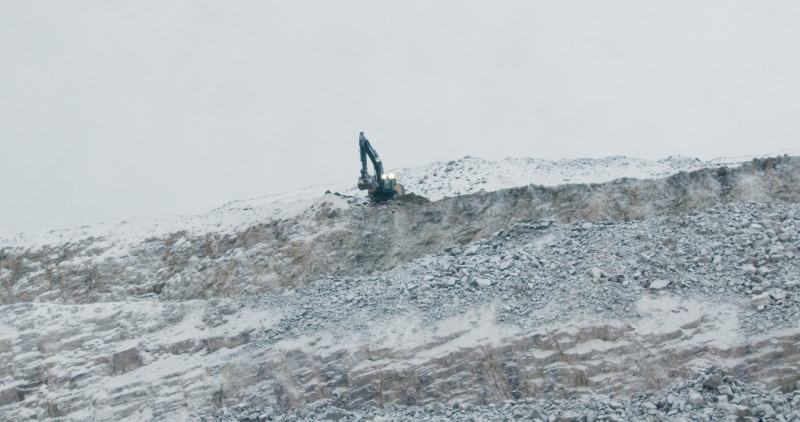
Join us at O—Overgaden on Friday 16 June at 13–17.30h for an extensive seminar on mining and territorial conflicts in northern Scandinavia, in relation to Nanna Elvin Hansen’s current solo exhibition Groundings.
In a newly produced film and sound installation consisting of footage from the landscape around the Giemaš quartzite quarry in the Sápmi region of northern Norway, Nanna Elvin Hansen investigates the mining of minerals, often for use in new “green” technology. Hansen’s exhibition, Groundings, at O—Overgaden also explores the connection between the quartzite excavation and the image and surveillance technology that remotely registers the Earth’s soil layers, landmasses, and migrations.
The seminar will feature the environmental NGO NOAH; Dr. Godofredo Enes Pereira, Head of Programme for MA Environmental Architecture at the Royal College of Art in London; Kate Utsi, reindeer herder and Chair of the Rákkonjárga reindeer district, Austertana. Together with Hansen they will share their scientific, artistic, activist, and personal knowledge on the territorialization of the ground and the many conflicts this foster locally and globally.
The seminar will initiate and unfold conversations about our relationship to the subterranean resources on which we, as northern European citizens, to a large extent rely. The talks and discussions on the day will also give insights into practices of living and acting that support care for the planet by advocating for sustainability through responsible relations between ecosystems and local people in areas with industrial mining.
The program will end with a sound performance by Nanna Elvin Hansen and sound artist Eliza Bożek.
The event will be held in English and participation is free of charge.
RSVP is not necessary.
The seminar is presented by O—Overgaden in collaboration with environmental NGO NOAH
About the contributors
Nanna Clifforth, Member of environmental NGO NOAH
Earlier this year, the EU released a regulatory framework on critical raw materials. It covers quartz, copper, and 30 other metals and minerals. The proposal aims to make the EU independent of imports of the critical raw materials that are used in technology for the green transition. We discuss the opportunities and challenges of bringing raw material extraction and mining back to Europe and point out that the need to reduce resource consumption is conspicuous by its absence in the legislative framework.
The environmental organization NOAH fights for a fair and sustainable world where decisions are made democratically. NOAH is the Danish member of the worldwide network Friends of the Earth International, and together with organizations in 73 countries, we fight for environmental justice.
Kate Utsi
Reindeer herder and Chair of the Rákkonjárga reindeer district
What consequences does the mining industry and the industry of green development have for reindeer herds and local communities in Sápmi? As a local reindeer herder raised in a Sámi family, Utsi speaks about a vulnerable society characterized by conflict between the Sámi and Norwegians – a fight to protect the wilderness against encroachment.
Kate Johanne Utsi grew up in a reindeer-herding Sámi family in Varanger in eastern Finnmark. Utsi is a reindeer owner and Chair of the Rákkonjárga reindeer district. She took over the family business of reindeer herding from her father 10 years ago and now runs the herding full time.
Dr. Godofredo Enes Pereira
Head of Programme for MA Environmental Architecture, RCA, London
The race for lithium is accelerating across the world, justified by the “green transition” away from oil and coal. Lithium is part of a group of metals (such as cobalt, copper, and rare earths) that are crucial in the shift towards electromobility. Unfortunately, the impacts of this new expansion of the underground frontier are often left out of the marketing of “clean energy”. Travelling through the collapsing ecologies of the Atacama Desert in Chile, to the mountains of Barroso in the north of Portugal, “The Ends of the World” will focus on the social and environmental impacts of lithium mining.
Dr. Godofredo Enes Pereira is the Head of Programme for the MA Environmental Architecture, Royal College of Art, London. For the past decade Pereira has been conducting research, publishing, and exhibiting on environmental architectures and collective politics. Prior to joining the RCA, he taught at the Bartlett School of Architecture. He was a member of Forensic Architecture where he led the Atacama Desert Project. He has recently created the Territorial Research Group (G.I.T.) focusing on ecological and environmental struggles.
Nanna Elvin Hansen & Eliza Bozek
Sound performance: Watery Bodies by Giemaš
Watery Bodies by Giemaš is a sound piece by artists Nanna Elvin Hansen and Eliza Bożek from the shore of the small Sámi village Lávvonjárga, facing the mountain of Giemaš and at the estuary of the Deatnu river. It was created as a two-day radio live-stream on The Lake Radio in 2023; for this seminar, we will get to listen to part of it.
Nanna Elvin Hansen is an artist and filmmaker, and graduate of the School of Media Arts at the Royal Danish Academy of Fine Arts (2021). In 2015, she co-founded the collective project The Bridge Radio.
Eliza Bożek is a Copenhagen-based artist with a background in electronic music and performing arts-oriented sound design, working within the field of composition, installation, dance, theater, and digital art. She sees sound and listening as methods of activism that can be used as primary tools for empathizing with other humans and non-humans.
